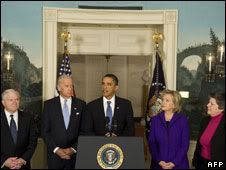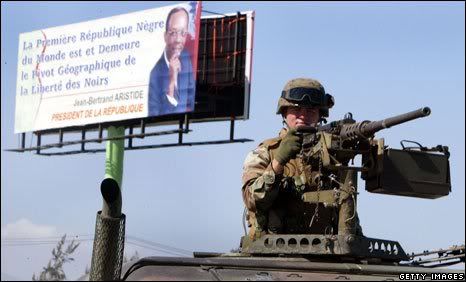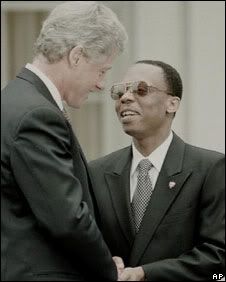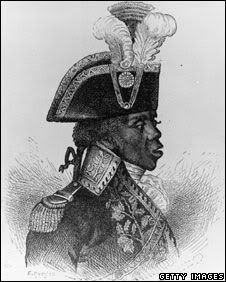
President Obama said he would make the relief efforts in Haiti a priority

President Jean-Bertrand Aristide accused the US of ousting him in 2004

The Clinton Administration intervened to restore President Aristide to power

Toussaint L'Ouverture became an icon for the abolitionist movement
When US President Barack Obama announced that one of the biggest relief efforts in US history would be heading for Haiti, he highlighted the close ties between the two nations.
"With just a few hundred miles of ocean between us and a long history that binds us together, Haitians are our neighbours in the Americas and here at home," he said.
Hundreds of thousands of Haitians have indeed become neighbours of Americans.
Some 420,000 live in the US legally, according to census figures. Estimates of the number of Haitians in the country illegally vary wildly, from some 30,000 to 125,000.
It is a sizeable diaspora which wants to see quick and decisive action from its adopted homeland.
Desperate to see aid getting through to friends and relatives, many expatriate Haitians have welcomed President Obama's decision to send up to 10,000 troops to help rescue efforts.
Historically though, US military deployments to Haiti have been controversial to say the least, and ties have often suffered.
Shared history
Both countries were born out of a struggle against European colonisers.
The US declared independence from Britain in 1776 - the first to do so in the Western Hemisphere - followed by Haiti, which broke away from France in 1804.
But there the similarities end. While the American War of Independence was driven by a white elite unwilling to continue paying taxes to its colonial masters, the Haitian revolution was led by a freed slave, Toussaint Louverture.
The existence of a nation of freed slaves to the south became an inspiration for slaves in the US, and a thorn in the side of many Southerners who relied on slavery for their economy.
During the Civil War in the 1860s, the animosity of the Confederate States towards Haiti would sour relations between the two nations for decades to come.
But Haiti's geographical proximity to the US and its strategic location in the Caribbean sparked the interest of American administrations.
Strategic interest
In the 19th Century, it was eyed as the location for a potential naval base.
US leaders also feared foreign occupation of the island at a time when European powers were trying to expand their sphere of influence.
In 1868, President Andrew Johnson suggested the annexation of the whole island of Hispaniola - present-day Haiti and the Dominican Republic - to secure a US presence in the Caribbean.
His suggestion was not followed, but American warships were active in Haitian waters 17 times between 1862 - when the US finally recognised Haiti's independence - and 1915, when it occupied the country.
Assistant Secretary of State Alvey Adee summed up the US view of Haiti in 1888 when he called it "a public nuisance at our door".
Tumultuous history
In the following decades, Haiti would only become more of a headache to its big neighbour.
Between 1888 and 1915, no Haitian president completed his seven-year term.
Ten were killed or overthrown, including seven in the four years to the US invasion of 1915. Only one died of natural causes.
In 1914, President Woodrow Wilson took control of the Haitian National Bank by sending in marines, who removed $500,000 of its reserves "for safe-keeping" in New York.
The assassination of the Haitian president a year later finally prompted President Wilson to invade Haiti with the aim of protecting US assets and preventing the further strengthening of German influence in the region.
After failing to make the new Haitian legislature adopt a constitution which would allow foreign land ownership, the Wilson administration forced the legislature to dissolve in 1917. It would not meet again until 1929.
The US finally withdrew from Haiti in 1934 as part of President Franklin Roosevelt's "Good Neighbour Policy", which stressed co-operation and trade over military force to maintain stability in the Americas.
Duvalier era
Many Haitians fled to the US during the political repression under Francois "Papa Doc" Duvalier and his son Jean-Claude "Baby Doc" Duvalier.
At first, the US government welcomed the refugees, but as the numbers swelled and boatloads of Haitians arrived on the South Florida coast in the 1970s and 1980s, this attitude changed to a policy of intercepting boats at sea and returning those on board to Haiti.
After decades dominated by dictatorships and coups, democracy was restored in 1990 when Jean-Bertrand Aristide was elected in a popular vote.
The ousting of President Aristide by a military regime in 1991 led to a new wave of Haitians headed for the US.
Military deployments
Faced with increasing chaos just south of its shores and an ever-growing stream of refugees arriving on - and often sinking off - Florida's shores, President Bill Clinton sent a US-led intervention force to Haiti in 1994.
A last-minute deal brokered by former President Jimmy Carter allowed the troops to go ashore unopposed by the Haitian military and police.
Constitutional government was restored and Mr Aristide returned to power.
US troops left after two years - too soon, some experts argue, to ensure the stability of Haiti's democratic institutions.
Jean-Bertrand Aristide stayed in power until 1996, and was re-elected in 2000.
While he enjoyed the support of the Clinton administration during his first term of office, allegations of corruption and links to the drugs trade during President Aristide's second term made for a rocky relationship with Washington.
After an uprising against President Aristide in 2004, US forces returned to Haiti, this time to airlift him out of the country.
Mr Aristide accused the US of forcing him out - an accusation the US rejected as "absurd".
With the crisis averted, US interest in Haiti lessened. A UN-led mission took over from US troops in June 2004 and continues to be present there.
'American leadership'
The election of President Obama and the nomination of Bill Clinton to the post of UN envoy to Haiti, combined with a period of relative political stability, led to a strengthening of US-Haitian ties.
Bill Clinton and Secretary of State Hillary Clinton, who spent their honeymoon in Haiti, have long taken an interest in the country.
President Obama has enlisted their help, alongside that of former President George W Bush, to help drive fundraising for Haiti.
Speaking on Thursday, President Obama said that this was "one of those moments that calls out for American leadership".
This US intervention, he stressed, would be "for the sake of our common humanity".
Read more about Haiti.










0 comments:
Post a Comment